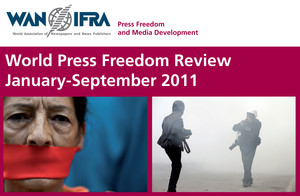44 journalists have been killed so far in 2011 and hundreds of media employees have been harassed, threatened or physically attacked. Impunity prevails in many parts of the world for the perpetrators as they seek to influence or mislead public opinion by targeting a free press. The story of each journalist is different, but fundamentally the issue remains the same; they were sanctioned for pursuing the human right to inform and to express ideas freely - the condition necessary for achieving any other right.
- Media professionals across the Americas are increasingly exposed to the wave of violence resulting from the conflict between drug-trafficking syndicates and government authorities. Populist regimes’ intolerance of dissent or scrutiny has led to increasing harassment of the critical and independent press through criminal defamation legislation. More than ever before, governments have become the biggest enemies of press freedom in the region.
- In Asia, established democracies have seen a rise in impunity, censorship and violence against journalists in the past year. In the Philippines, President Benigno Aquino III is yet to follow through with promises to end impunity after a year in office. In the ongoing court case dealing with the Maguindanao massacre (2009), allegations of bribery from a relative of one of the deceased were immediately met with spurious contempt of court charges. Additionally, reports of violence against journalists have risen in Indonesia while in Pakistan attacks against the media continue to make the country one of the world’s deadliest for journalists.
- Press Freedom continues to suffer from a deep-rooted culture of impunity, intimidation and harassment in certain parts of Central and Eastern Europe and Central Asia. Violence against the media, the use of defamation legislation and ill-thought-out regulation seriously undermine the work of media professionals in the region.
- Despite the fall of dictatorships in across the Middle East and North Africa, little progress has been made in installing legislation that will protect the freedom of the press in Tunisia, Libya and Egypt. Governments in other Arab states have been obliged to make concessions to pro-reform demonstrators in order to remain in power, but promises of change have likewise brought little improvement in terms of media freedoms. A media blackout in Syria helped obscure the full extent of the regime’s brutal crackdown, with protestors for a time providing the only footage from inside the country. In Yemen, journalists were deliberately targetted in March as state-orchestrated violence errupted in response to calls demanding President Saleh step down. Bahrein’s authorities, with help from their Saudi neighbours have systematically hunted down, imprisoned and reportedly tortured bloggers and freedom of expression activists who participated in pro-reform demonstrations earlier in the year.
- Sweeping anti-terrorism laws, criminal defamation and treason charges are regularly used to detain local and foreign journalists who criticise or question authority in Sub-Saharan Africa. A culture of unrelenting violence, harassment and intimidation, particularly alongside elections, continues to stifle freedom of expression, however some gains have been made in countries such as Liberia and Nigeria where legislation protecting access to information has been tabled. The African Platform on Access to Information (APAI) Declaration made in Cape Town, South Africa, on 19 September states that access to information is a fundamental human right, laying out a set of key principles that are designed to promote universal accessibility to information in a new digital age. It is hoped this pan-African initiative will provide the basis upon which meaningful legislation can not only be formulated, but also effectively enacted.
Read the online e-Paper or download the full report below.




